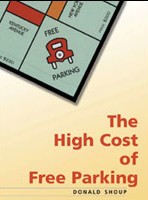It's economics stupid
My friend-colleague Drew "hates" economists. But I am not so critical. Some of them focus on what matters, and why people act the way they do. Because so many costs of products are not "internalized" people make decisions that benefit themselves, but in ways that push the real costs onto others. These are called externalities, and "market failures" and are the justification for government regulation.
Parking is a classic example. A few weeks ago, I reprinted Dan Zack's email to a list I'm on about parking, in response to a NYT article about parking rage in San Francisco. See "More on Parking."
Dan's point, and one similar to the point by Don Shoup in his book, is that the pricing for street parking is all wrong. It should be priced at its demand, higher than the cost of parking in a structure. But instead, it's priced much lower than the cost of parking in a structure.

So you get people searching for the limited number of spaces, getting angry, and making the wrong decisions from the collective standpoint.
This AP story illustrates perfectly that the issue really is the under-pricing of scarce street based parking spaces, "Startup hopes to modernize parking hunt." This company has an opportunity to make money off the public space, in terms of the inventory of public parking spaces, because cities are not pricing properly the value of the space.
From the article:
A startup company is betting it can chip away at that anachronism and transform the search for parking just as eBay Inc. changed auctions. SpotScout Inc. hopes to create an online marketplace where drivers armed with mobile phones can not only reserve private spaces in garages and driveways, but also swap public parking spots in real time, with vacant spaces going to the highest bidder.
Analysts who track emerging online applications say the fledgling venture could successfully capitalize on the growing popularity of mobile Web-surfing and big-city parking frustrations. But they also question whether SpotScout can make online parking searches sufficiently quick and easy to win over a critical mass of consumers willing to abandon the old-fashioned way of hunting for a spot.

Here are some things to think about:
1. Parking permits for residential use are priced too low.
2. Larger vehicles should pay more.
3. The price for each permit should escalate according to the number of permits issued per household.
4. Spaces on the street should be sized for different types of vehicles, and larger vehicles should pay more.

Etc.
Labels: parking, transportation demand management, transportation planning



0 Comments:
Post a Comment
<< Home